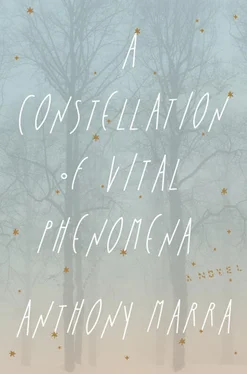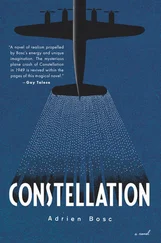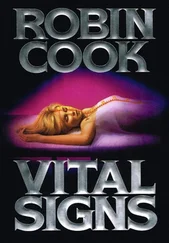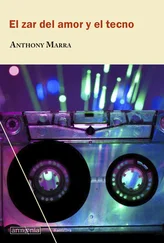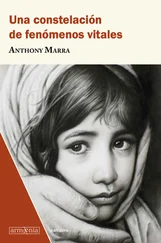A few days later, the fingerless man and the doctor were summoned to the sixty-first rung. The fingerless man had difficulty climbing. The doctor helped. For the following day and night, the men at the bottom of Pit B, those who would survive and those who would not, prayed at the epitaph of the fingerless man and the doctor. Twenty-four hours after the two ascended to the sixty-first rung, the men of Pit B, those who would break and those who would not, each packed a fistful of clay into the wall. Their palms were wet and cold, and they were solemn. When the names of the two men were buried, everyone knew they were finally gone.
But if they were to remember anything of the fingerless man and the doctor, they would remember the initial conversation, when no one was sure what the two meant to each other. The doctor had approached the fingerless man. For a moment they stood apart, each uncertain of the other. Then the fingerless man opened his arms, and the doctor stepped into them, and the two men swayed as they held each other, revolving in a private zikr that they alone understood. No one knew what to make of these two men who had found each other in the mud of the Landfill and begun dancing. No one had ever seen anything like it. The doctor whispered, wary of the other men, and no one could say what passed between the two as they turned together, whether a confession, or a story, or an apology. Someone claimed to have heard the doctor repeat she is safe , three times, but the man who heard this received regular visits from his deceased in-laws, and no longer trusted his senses. What all heard, what all remembered, was the fingerless man leaning back in the doctor’s arms, lifting his face, and laughing, a sound none had heard in many days, his cheeks wet as he roared a name— Havaa, Havaa, Havaa —and those who witnessed would remember how here, in Pit B, a man who had lost his freedom and his fingers, and would soon lose his life, had found in that name an immense, spinning joy.
IN WRITING THIS novel I drew from the following sources, all of which I would urge anyone interested in Chechnya or modern Russia to read.
To get a glimpse into the day-to-day life of a wartime Chechen surgeon, I relied on Khassan Baiev’s magnificent memoir, The Oath: A Surgeon Under Fire . Anna Politkovskaya’s haunting, harrowing A Small Corner of Hell: Dispatches from Chechnya was always in arm’s reach, and I have included several of her anecdotes in altered forms. Baiev and Politkovskaya are two of the few heroes of the Chechen conflict, and their writing is essential and courageous testimony.
For descriptions of and insights into wartime Grozny, the deportations, and the Caucasian petroleum industry, I turned to The Angel of Grozny: Orphans of a Forgotten War by Åsne Seierstad and Allah’s Mountains: The Battle for Chechnya by Sebastian Smith. In my chapter 12, a number of the descriptions of Chechnya between the collapse of the Soviet Union and the First Chechen War are drawn from Smith’s journalism; additionally, Sonja’s attempt to re-create for Akhmed the ruined Grozny square is based on Smith’s account of a Chechen woman doing the same for him. Both Smith and Seierstad have spent extensive time reporting from Chechnya, and together their books form a panorama of the past two decades in the Northern Caucasus.
In writing the zachistka I drew from Andrew Meier’s description of the Aldy zachistka in his vast and powerful Black Earth: A Journey Through Russia After the Fall . While researching his book, Meier traveled from Chechnya to the Arctic, from the Pacific Ocean to the Gulf of Finland, and has created the most encompassing single-volume account of post-Soviet Russia that I’ve yet read.
For Natasha’s journey through the Breaking Grounds and into Western Europe, I turned to The Natashas: Inside the New Global Sex Trade by Victor Malarek and Sex Trafficking: The Global Market in Women and Children by Kathryn Farr. One Soldier’s War by Arkady Babchenko, Towers of Stone: The Battle of Wills in Chechnya by Wojciech Jagielski, The Chechens: A Handbook by Amjad Jaimoukha, and I Am a Chechen! by German Sadulaev provided valuable historical and cultural context. Joseph Barnard Davis and his 1,474 skulls come from Human Remains: Dissection and Its Histories by Helen MacDonald. I owe debts of influence and inspiration to the body of fiction dealing with political disappearances, particularly Daniel Alarcón’s Lost City Radio and Michael Ondaatje’s Anil’s Ghost —both novels include scenes of artists summoning images of the missing, which inspired Akhmed’s portraits. Sonja’s scene with Ula owes a debt to “Old Boys, Old Girls” by Edward P. Jones. The axis on which this novel rests is formed from two narratives shared by Islamic and Christian traditions — that of a parent asked to sacrifice a child, and that of an orphan delivered into the family responsible for her orphanhood — and in thinking of these, I’m grateful for N. J. Dawood’s elegant translation of the Koran and The New Oxford Annotated Bible . Finally, Hadji Murád , the last and among the most powerful of Tolstoy’s novels, appears in a beautiful translation by Richard Pevear and Larissa Volokhonsky in The Death of Ivan Ilyich and Other Stories .
MY GRATITUDE TO the Stanford Creative Writing Program, the Iowa Writers’ Workshop, the Truman Capote Literary Trust, and the Patricia Rowe Willrich Fellowship for supporting this novel, and to the Bread Loaf Writers’ Conference and the Sun Valley Writers’ Conference for their votes of confidence.
This book couldn’t have found a more phenomenal editor and advocate than Lindsay Sagnette. My thanks to her, Becky Hardie in the UK, Anne Collins in Canada, Molly Stern, Christine Kopprasch, Rachel Rokicki, and everyone else at Crown. I’m grateful to Tom Jenks, Carol Edgarian, and Josh Clark at Narrative magazine, where Sonja, Akhmed, and Havaa first appeared, and to Olga Zilberbourg, for fielding my many Russian-related questions. And a big thanks to Austin Ratner and Christina Minami, brilliant novelists and physicians both, for pointing out my many medical inaccuracies.
Chechnya has been utterly transformed in the past decade, in large part due to the efforts of a younger generation determined to rebuild the republic. My thanks to those whose help and hospitality made my travels in Chechnya possible. All these pages aren’t enough to convey my appreciation and respect.
At Stanford, I’m grateful for the support and feedback of Eavan Boland, Adam Johnson, Elizabeth Tallent, Tobias Wolff, and the Stegner Workshop that graciously read long pieces of this novel: Josh Foster, Helen Hooper, David Kim, Dana Kletter, Justin Perry, Shannon Pufahl, Nina Schloesser, Justin Torres, Juliana Xuan Wang. And at Iowa: Erika Jo Brown, Scott Butterfield, Ethan Canin, Andres Carlstein, Lan Samantha Chang, Patrick Haas, Michelle Huneven, Allan Gurganus, Alexander Maksik, and Elizabeth McCracken. Jay Muranaka for his friendship. Christina Ablaza, Connie Brothers, Krystal Griffiths, Deb West, and Jan Zenisek for having the answer to just about everything.
To my family, my friends from D.C., and people who still know me as Hal: thank you.
Peter Orner, my thesis advisor, was the third person to read this novel.
Janet Silver, whose insight and generosity is felt on every page, was the second person.
Margaret Reges, the heroine in my own story, was first.
Anthony Marra was born in Washington, D.C. He holds an MFA from the Iowa Writers’ Workshop and is currently a Wallace Stegner Fellow in Creative Writing at Stanford University. He has won The Atlantic ’s Student Writing Contest, the Narrative Prize, and the Pushcart Prize, and his work has been anthologized in Best American Nonrequired Reading . In 2012, he received the Whiting Writers’ Award. He has studied in, resided in, and traveled throughout Eastern Europe, and now lives in Oakland, California. A Constellation of Vital Phenomena , his first novel, will be published in a dozen countries.
